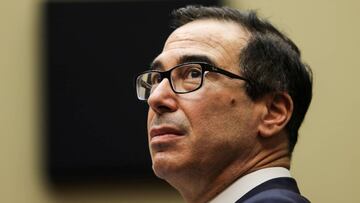Second stimulus check: what's in Mnuchin's new proposal?
Roll Call reported an exclusive on progress in talks between Republicans and Democrats regarding a new round of Covid-19 relief payments this week.

Stimulus check negotiations: finally breaking the impasse?
After almost 5 months of stalemate and now with less than 5 weeks before Election Day, it appears Republicans have finally moved the stimulus check bill to the top of their to-do list. Treasury Secretary Steven Mnuchin and Speaker of the House, Democrat Nancy Pelosi renewed talks this week with Pelosi on Monday proposing a stripped back HEROES bill.
Both sides of the political divide have been unable to come to an agreement over the finer points of a new relief bill, but there is broad consensus on the need to provide a second round of stimulus checks to US citizens hard-hit by the economic effects of the Covid-19 pandemic.
Speaker Pelosi and Treasury Sec. Mnuchin fail to reach stimulus deal, but will continue talks as House pushes ahead with vote - @CNBC https://t.co/FLfM3wVb4v
— NBC News (@NBCNews) September 30, 2020
The bill, if passed would authorise a second round of payments across the US to help families and individuals in the midst of the economic crisis brought on by the pandemic.
It is thought that the final package will eventually fall somewhere between the amounts laid out in HEROES and HEALS, in line with the $2.2 trillion provided by the CARES Act.
What’s in Mnuchin’s new proposal?
Among other things, the counter-proposal put forward yesterday by the Treasury Secretary would release more money for schools, coronavirus tests and include a $400 per week unemployment benefit, Roll Call reports.
The total cost of the bill put forward by Mnuchin stands at $1.62 trillion, and offers more state and local assistance than GOP negotiators have to date, Roll Call reports.
The new proposal is said to include $250 billion for state and local governments, which is $186 billion less than Democrats want in their latest $2.2 trillion package, but $100 billion more than Republicans offered in talks that broke down over the summer.
The unemployment benefit renewal would be retroactive to September 12 and last through until January 1 2021. Democrats are demanding $600 per week by comparison.
Pelosi says Republicans’ prior offer of $16 billion on expanding Covid-19 testing and tracing was a significant underestimate of the demand. Mnuchin’s offer matches Democrats’ $75 billion demand, a key concession.
Mnuchin’s total offer on health care is $175 billion, which in addition to the testing money includes $50 billion for vaccine production and distribution and $50 billion for health care providers, including hospitals. Comparatively, Democrats’ bill would provide the Department of Health and Human Services with a total of $249 billion for those and other needs.
Both parties still agree on another round of direct payments to low-income Americans, with general agreement on $1,200 for adults and $500 for dependents.
NEW HOPE for another federal stimulus bill! https://t.co/l1QV7iW0AY
— ABC12WJRT (@ABC12WJRT) September 30, 2020
What is the likely date for an agreement on stimulus bill?
Earlier this week, Pelosi was ‘hopeful’ that an accord could be met this week on the bill.
Mnuchin too expressed hope in a conference this week that an agreement could be reached; “I say we’re going to give it one more serious try to get this done and I think we’re hopeful that we can get something done…I think there is a reasonable compromise here.”
Mnuchin and Speaker of the House Nancy Pelosi met for 90 minutes on Wednesday to continue negotiations, but left the meeting without a deal. It is thought that talks will continue today, Thursday 1 October.
"The speaker thinks there's a possibility of getting a deal," House Majority Leader Steny Hoyer told Roll Call after a lengthy meeting with Pelosi, continuing that if a bipartisan deal can be struck with Republicans, Democrats may delay voting by several days on their own HEROES bill.
DEVELOPING: House delays vote on $2.2 trillion coronavirus stimulus bill to allow more time for talks https://t.co/gIObsZSZOC
— CNBC Now (@CNBCnow) September 30, 2020
Despite renewed hope, time is running extremely short for any package to pushed through before the presidential elections.
Related stories
The House was scheduled to recess no later than 2 October so members can campaign at home for re-election on 3 November. But, echoing Pelosi, House Majority Leader Steny Hoyer said lawmakers will be on indefinite standby, with 24 hours’ notice of any vote on a coronavirus aid bill if a deal is reached.
Potential dates for a vote in the Senate (based on Congressional voting schedules) include 9/12 October, 16/19 October and 23/26 October.


